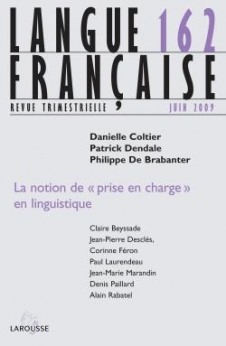
Langue française n° 162 (2/2009)
Pour acheter ce numéro, contactez-nous
Recevez les numéros de l'année en cours et accédez à l'intégralité des articles en ligne.
Distingue entre le prix en la charge d'un contenu logique qu'enunciator principal (primaire) prend la responsabilité de parce qu'elle suppose que c'est vrai et l'attribution d'un contenu à enunciator secondaire (e2). Dans le dernier cas (caisse), l'enunciator, qui dit rien, ne fonctionne (se produit) aucun prix réel ne facture (charge) en, mais suppose qu'e2 doit avoir approuvé le contenu à un stade antérieur. Le papier(journal) soutient plus loin que le prix facture(charge) en doit être défini en termes non seulement de vérité, mais aussi des traces d'intersubjectivité et l'interaction entre enunciators. Tous ces paramètres affectent la position(le poste) premier enunciator prend quant à un point de vue attribué (pov) : a) la prise de cela en considération (le prix en compte) sans assumer la responsabilité de cela (c'est-à-dire adopter une position neutre); b) le prix facturent (chargent) en par l'acceptation.
Distinguishes between prise en charge of a propositional content that the primary enunciator takes responsibility for because she assumes it is true, and ascription of a content to a secondary enunciator (e2). In the latter case, the enunciator, who says nothing, performs no actual prise en charge, but assumes that e2 must have endorsed the content at an earlier stage. The paper further argues that prise en charge is to be defined in terms not only of truth, but also of traces of intersubjectivity and interaction between enunciators. All of these parameters affect the position the first enunciator takes regarding an ascribed point of view (pov) : a) taking it into account (prise en compte) without assuming responsibility for it (i.e. adopting a neutral stance) ; b) prise en charge through agreeing with the ascribed pov (prendre à son compte) ; c) non prise en charge (through explicitly disagreeing with an ascribed pov).

